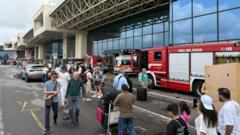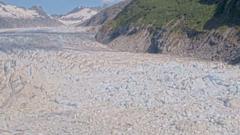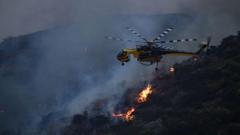Smoke from rampant wildfires in Manitoba, which is experiencing its most severe fire season in three decades, has spread eastward, elevating air pollution to dangerous levels across major cities in Canada, including Toronto, and impacting parts of the Midwestern United States. This phenomenon follows an intensely hot weekend, pushing air quality to some of the worst rankings globally according to IQAir, a leading air monitoring service.
Toronto, Canada’s most populous city, and several regions in Ontario received air quality alerts from Environment Canada on Monday. Residents were cautioned against strenuous outdoor activities due to the thick haze and poor air conditions. This issue extended into the U.S., affecting areas in northern Minnesota, Wisconsin, western New York, and northern Pennsylvania, where air quality has significantly declined.
While smoke generally poses less risk to human health when it's elevated in the atmosphere, it becomes a major concern when it drifts downwards. Ian Hubbard, a meteorologist with Environment Canada, indicated that Toronto’s air quality might improve as it transitions into the following days, though the region is expected to endure above-normal temperatures exceeding 30 degrees Celsius (86 degrees Fahrenheit).
Despite a less intense wildfire season in Canada this year compared to 2023, Manitoba has been grappling with its worst situation in decades. Premier Wab Kinew declared a state of emergency twice since May, significantly due to evacuations after wildfires resulted in two fatalities and the displacement of over 30,000 individuals, many of whom have had to be airlifted from remote areas.
The ongoing wildfires have sparked renewed tensions between the U.S. and Canadian governments, as six Republican legislators from Wisconsin and Minnesota placed blame on Canada for the smoke. Congressman Tom Tiffany from Wisconsin criticized Canadian forest management online, asserting that Canada must account for its wildfire handling amid the crisis.
Most wildfires in Canada ignite in remote areas lacking forestry oversight, primarily triggered by lightning strikes, highlighting the challenges of wildfire management in less accessible regions.




















